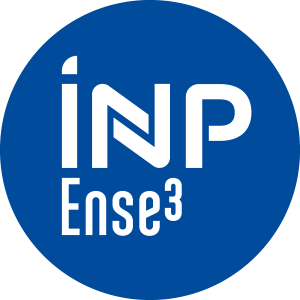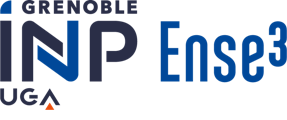Number of hours
- Lectures 16.0
- Projects -
- Tutorials -
- Internship -
- Laboratory works 44.0
ECTS
ECTS 5.0
Goal(s)
Acquiring the basic skills in theory of communication systems, communication protocols for computer networks, remote and distributed processes.
Starting from the fundamentals of Information Theory, set by C. Shannon, which, in a communication context,allow to assess the limits of possibility in terms of source coding and channel capacity. In particular, the concepts of mutual information and source encoding and channel is introduced. Finally, we are interested in defining the ability of a discrete communication channel and continuous.
We continue with the non-exhaustive presentation of TCP / IP protocols. After the presentation of the concepts of socket programming the remote plant control and distributed methods are used together. Also we learned the basics of network diagnostic communications.
Stephane MOCANU
Content(s)
Information Theory
1 Introduction: information?
2 Hartley information and Shannon entropy
3 Equalities and inequalities involving the notion of entropy
4 Mutual information and channel capacity.
5 Source coding
6 Channel coding
Communication networks
7 Introduction communication networks / Internet
? Overview of corporate networks (switched networks and network interconnection with routers).
? Generalities on Internet Service Providers.
? Case Study: Renater / GÉANT2.
? Peering points and Internet
8 Classification of networks (topology, access, LAN, backbone)
? Common Bus
? Token Ring
? Star
9 OSI and TCP / IP
? Introduction of protocol stacks
? Benefits of architectures
? Explanation of concepts layer, service, protocol, service access points
10 Physical Layer,
1 Categories wiring
2 coding methods:
? voltage level,
? NRZ
? Manchester
11 Link layer,
? building frames
? error check
? Hamming distance
? Codes detectors and correctors
? RSC
? CRC
? access control, static and dynamic mechanisms,
? comparison multiplexing time / frequency
? deterministic access: master / slave, token priority
? Random Access: ALOHA CSMA / CD
12 Ethernet Networks
? Versions, standardization
? Frame Format
? 10Base-T Ethernet
? RJ45 and voltage levels
? MDI MDI-X and Auto-MDI-X
? CSMA / CD Ethernet
? Switching
? Fast Ethernet
? Coding 4B / 5B
MLT-3 signal ?
? Gigabit Ethernet
? Auto-Negotiation (FLP NLP)
? Full duplex and burst transmission
? Ethernet Switching
? Store-and-forward / Cut-through
? Tree covering and STP
? VLAN
13 routing, algorithms, protocols
? algorithms: shortest path routing flow, distance vector
? tables routing management: hierarchical routing, CIDR
? IPv4
? packages
? address classes
? masking and subnets
? ICMP
? IP protocols / Mac: ARP and RARP
? routing protocols: RIP, IGRP, OSPFn
? VPN
? IPv6
14 Transport layer, TCP and UDP
? Format segments
? Ports and addresses transportation
? Sockets
? TCP and Flow Control
? AIMD Tahoe and Reno
? IADI: Vegas
15 Application Layer
? DNS
? structure of the database
? DNS queries
? HTTP
? language
? and proxy applications
? email
? SMTP, and principle language
? itinerant email: POP and IMAP
practical part
16 Basics of network programming
? programming TCP / IP (sockets)
? RS-232 system programming
17 Remote and Distributed Process Control
M4, M7, M8, M A/I/S, Module Informatique temps-réel
CC 60% +CT 40%
The course exists in the following branches:
- Curriculum - Master's Degree in Engineering ASI - Semester 8
Course ID : 4EUS4SCA
Course language(s): 
You can find this course among all other courses.
- Andrew Tannenbaum - Réseaux, Dunod, 2008
- Guy Pujolle - Réseaux, Eyrolles, 2008
- Maîtriser la SSI pour les systèmes industriels, disponible sur http://www.ssi.gouv.fr/systemesindustriels
- Cas pratique, disponible sur http://www.ssi.gouv.fr/systemesindustriels
- Méthodes de classification et mesures principales, disponible sur http://www.ssi.gouv.fr/systemesindustriels
- Mesures détaillées, disponible sur http://www.ssi.gouv.fr/systemesindustriels
- Guide d'hygiène informatique publié par l'ANSSI disponible sur http://www.ssi.gouv.fr
French State controlled diploma conferring a Master's degree




